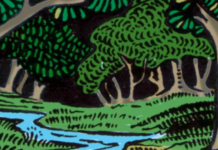
Maiden Magick
, by C. C. Brondwin
New Page Books, 1564146707, 211 pp. (+ bibliography & index), 2003
I must admit to a bias when I started this book. Actually, a couple of them. The first is a culturally based one. This is a book written for a young female, and I am neither. The second bias is a personal one. I read (and reviewed) Clan of the Goddess by this same author and found it disappointing in a number of ways. So, I was already poised to dislike this current offering.
My major problem with Ms. Brondwin, and authors like her, is her tendency to look to the past as we wish it had been. She sees the young maidens of Celtic clans as being highly honoured and treated as special. They may have been. They may also have been treated as chattel and have had lives of drudgery. Fairness demands equal representation for differing points of views.
Once again Ms. Brondwin says that you can worship the Goddess without giving up your familial religious beliefs. That may work in some cases, but certainly not all.
And again she comes up with an extremely simple method of invoking protective barriers. The last time it was a clenched fist. This time it is a triple tap of the third eye. The problem with these methods, in my opinion, is that while effective for an experienced handler of energy, they won’t work well for someone just starting down the path. All they will do is impart a false sense of confidence.
On the plus side, she does encourage young women to take charge of their own lives. She makes it clear that blaming others for problems is not the way of the Goddess.
I have to admit that many of the authors I have been reading lately, and not just feminists, seem to be suffering from a case of “history as it should have been.” Ms. Brondwin apparently sees Celtic peoples as having a predominantly joyous life with the women in charge and sees them as loving “…to dress up, wear makeup, and colour their hair with reds and purples and greens. They wanted a different hairstyle for every festival, and they’d spend hours doing each other up for the party.” (page 101). So who, I might ask was cooking the food, preparing the feasting area and watching the children? The Clan Mothers? No, they were busy running the tribe. The men? No, they were busy hunting, drinking and recounting their bravery on the hunt. According to Ms. Brondwin the food was prepared in advance and then the hired “…great musicians, storytellers, comedians and even puppeteers.”1
She asserts an emphasis on harming none as a basic fact of Celtic life. Tell that to the Roman legionnaires facing a screaming horde of woad-painted Celts who didn’t have enough sense to lie down and die when they had been run through. Tell that to the neighbouring tribes who had their cattle (and maidens) stolen in raids. If they had been as peaceful as she believes, they would have been wiped out long before they were assimilated into the general European population.
Her designation of “Ire” (the fifth element) as a “lesser” element may work for her, but most folks I know consider that elements (often called “Spirit”) to be the source of the other four elements, and hence do not consider it to be less than the others.
I remarked on my earlier review of her writing that I have a problem with those who teach “the old ways” and then make them P.C. That isn’t as evident in this work, although her disparaging remarks about the consumption of alcohol in large quantities by the Celts were unnecessary, in my opinion. A simple statement that such is no longer expected would have been enough.
Once again, over half the book passes before any mention is made of male energies. This is, in my opinion, a very narrow perception of mankind and the Celtic peoples in particular. It conveys the impression that only the feminine part of the Celts had any interest, or involvement, in the spiritual life of the tribe.
According to Ms. Brondwin, merely thinking about a spirit instantly draws it to the individual. “Telepathy, channeling, or the calling up of spirits has instantaneous results.” (page 157). Not the way I was taught. She tells the reader how to communicate with spirits, and then says “There are certain cautions to be observed, and tricks for controlling your communications with the Otherworld. Read it [the next chapter] too, before you actually try to channel.”2 The warnings should come first, in my opinion.
Banishing an unwanted entity is as simple as saying “Go in peace. Leave me.”?3 Excuse me? Well, if that is true, why did we have to learn to create a protective garment (the Lorica), and make a fist of power? Ms. Brondwin’s work appears to be at a very low level of energy, by the examples she cites.
Her view of the Celtic women’s life is one of constant joy and happiness. They laughed all the time. I have to wonder, when did they find time to tend the fires, raise the children, and be wives?
This is the second book I have read in the past month that I cannot recommend to the serious student. I really hate to say that about a book, but there it is. In fact, since this is the second book by this author which has elicited this response from me, I would hesitate to recommend any of her work. Although her book is categorized as “Young Adult/Wicca,” there is nothing of Wicca in it.
Save your money on this one.








